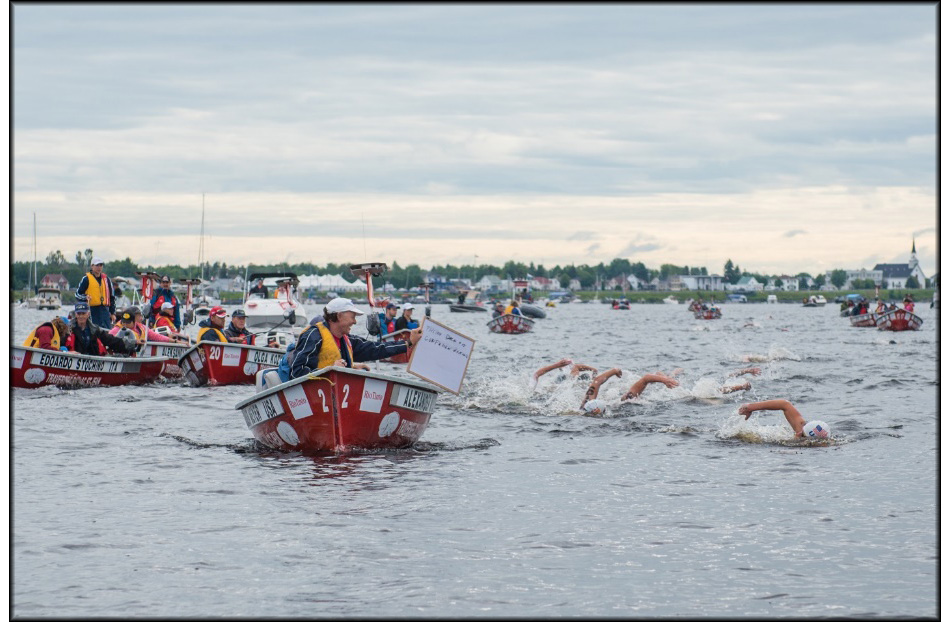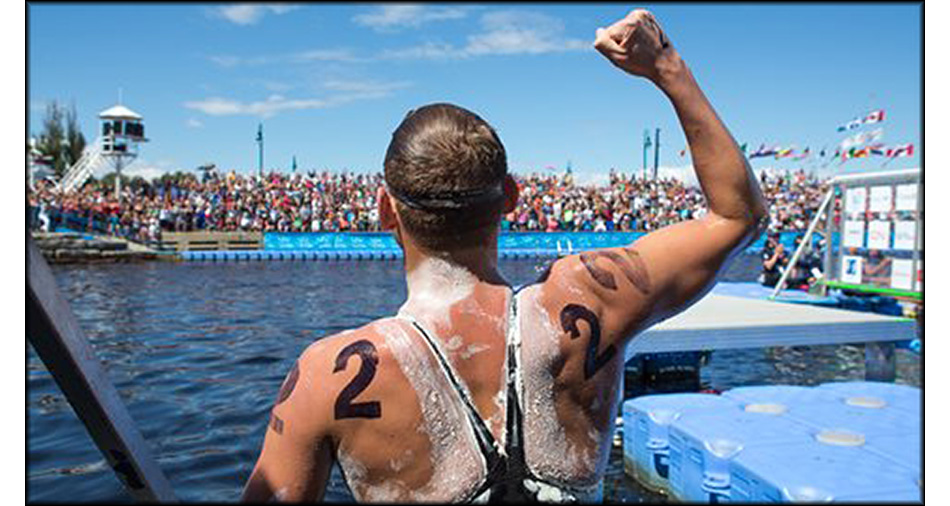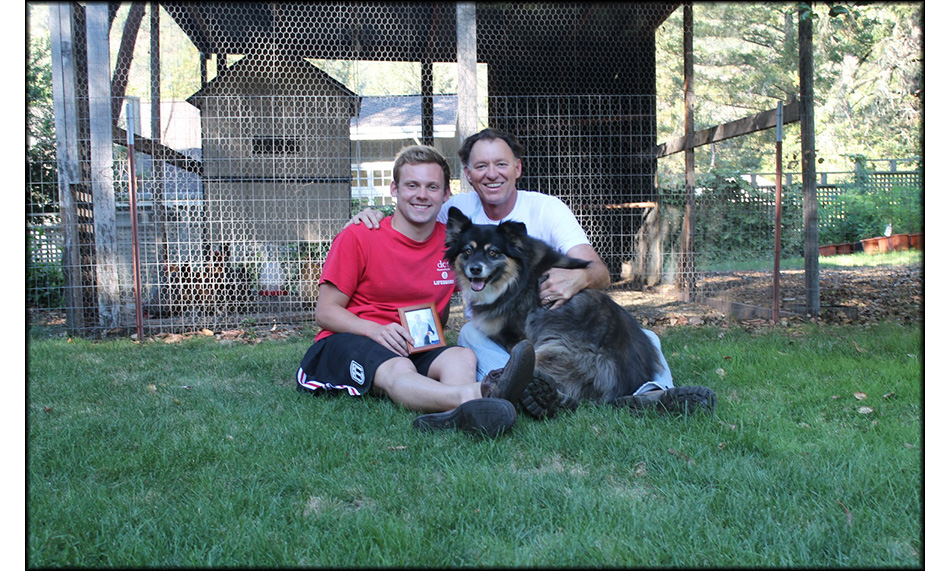
Alex in the Peribonka River at the start of the race
Photo courtesy of Vicky Boutin
As I watched Alex Meyer swim in the safety of the Roberval, Quebec harbor, I listened to the song “Beauty Will Rise” by Steven Curtis Chapman, a song and album written after the Chapman family had lost their daughter Maria to a tragic accident in 2006. The words about the joy that’s coming in the morning and the beauty that will rise resonated with me today. I had listened to the healing lyrics of this album hundreds of time over the last six years, and I prayed that there would indeed be joy in the morning for Alex. This was going to be the final marathon swimming race of his career.
Alex, the Crippen family, teammates, coaches, and USA Swimming community had all lived through the tragedy of losing Fran Crippen in 2010. Now I watched Alex preparing to swim in the last major competition of his career, and the most challenging. Would this be a continued healing process for all of us?
The 32-kilometer (21 miles) La Traversee Internationale du Lac St. Jean is the most difficult marathon swimming race in the world. The race starts on the north side of the lake in the small village of Peribonka. The swimmers race the first 3 miles in the Peribonka River, whose waters are always in the low 60s, and then chart a course of eighteen miles across the lake. It was once ranked in the top five hardest endurance races in the world, along with the Tour de France and Hawaii’s Ironman Triathlon. The cold water is one of the biggest reasons why completing the race is so difficult.
The race would be a transition for Alex, and for me, as we both continued to move through the grieving process for Fran six years later.
After the 2012 Olympics, Alex had continued to train for the 2016 games and committed himself to open water excellence. He medaled in many international competitions, including a silver medal in the 25-kilometer event at the Kazan, Russia, 2015 FINA world championships. To his great disappointment, he did not qualify for the 2016 Rio Olympics, and was now swimming in his last marathon swimming race.
Since 2010, Alex had traveled around the world competing, and always with him was a framed photo of Fran on the medal platform, holding his gold medal at the 2007 Pan American Games. Alex made sure to take a picture of himself and the photo together wherever he was. Fran and Alex continued to travel together, just like they dreamed. An amazing tribute to their friendship.
The morning of the swim dawned cold and cloudy with little wind on the river. Alex had trained very well in the months leading up to the swim and was diligent in his preparation. We were confident in his ability to swim 32 kilometers, as he had done 25-kilometer distances several times previously and was the fastest swimmer in the field. Alex wasn’t too concerned about the cold river water, but silently I knew that this race would be the biggest physical and mental challenge of his life.
There were twenty-five swimmers in the ready room—sixteen men and nine women representing ten countries. There were many marathon swimming veterans in the race, like Angela Maurer from Germany and Damian Blome from Argentina, along with previous race winners Tomi Stefanovski from Macedonia and Xavier Desharnais from Canada. Alex would have to swim really well to win the race and bring his strongest determination and focus to conquer Lac St. Jean.
Alex was quiet, and confident, in the ready room. One of his best friends from Harvard, Jamie Mannion, was also there to help. Alex was a pro, and the routine of greasing with lanolin, and race introductions, very familiar to him. Denis Lebel was on the dock, wishing him well. We had spent a lot of time with Denis and his family during the prerace week, relaxing and training at his lakeside home. It was enjoyable for both Alex and me to be surrounded by supporting family, friends, and fans. Many of Alex’s family had arrived along with his Harvard swimming buddies.
I left Alex to get in the boat, letting him know that he would be fine, and that I loved him. No hugs right now, I didn’t want to get the sticky lanolin all over me. Once in the boat, Alex’s mom Shawn handed me a bunch of American flags for a picture; all I wanted to do was get the race started. Taking a quiet moment before the race, I prayed for the safety of Alex, and the other swimmers, and my spirit was buoyed knowing that Marilyn was also praying at home.
The crowds were big, and loud, with television cameras, photographers, reporters, local celebrities, politicians, and fans everywhere. There were many Team Meyer supporters and American flags being waved. I knew that this support made Alex feel loved.
The swimmers came out on the dock and jumped into the icy 62.8-degree water. I knew that the lake may be as much as 5 degrees warmer than the river, and hoped we would find that “warm” water as soon as possible, because Alex was the least experienced in these frigid conditions, something with which I was deeply familiar.
The start went well for everyone as the swimmers navigated upriver for 400 meters against the current. Alex easily took the lead, and after about 10 minutes our boat was able to easily come alongside of him as they left the protected area and began swimming down the Peribonka River. We were with the current now and the water helped to swiftly push the athletes along.
At this point the pace was slow, and Alex was just relaxing in the lead. The slow speed allowed all of the swimmers to stay bunched closely together in one large pack. The escort boats were all jockeying for position next to their swimmer and there just wasn’t enough room. Tempers were short as the small fiberglass boats kept bumping into each other like bumper cars at the fairgrounds.

Alex in the Peribonka River at the start of the race
Photo courtesy of Vicky Boutin
Alex asked me to take some pictures in the river while he was swimming, with Fran’s picture in the frame. I did this early in the race while still in the river, to make sure to honor his request. Fran would always be with him and us.
We were clear on our feeding schedule of every 20 minutes and all seemed to be going well. I hung a thermometer in the water to monitor the temperature as the day went along. After about an hour Alex abruptly stopped, which caused all of the swimmers to deftly avoid him. As our boat stopped we were gently rammed by the surrounding guide boats.
“What’s going on?” I asked Alex.
He said, “I’m okay, just need to stop and pee.”
During marathon athletic events, athletes will often need to urinate. Colder water causes the breakdown of more stored body fats, which releases more water into the system, creating more urine than normal. This, along with the prerace hydration and slow pace, required an early need to urinate. Relaxing the bladder enough to eliminate while swimming is a challenging effort for many open water swimmers. When the body is cold and shivering this ordinary occurrence becomes a difficult experience for many.
Alex began swimming again and had fallen behind the pack by approximately 25 meters (about 75 feet). The pace continued to be slow and Alex quickly regained the lead. After an hour of racing, the water temperature was still a bone-chilling 63.2 degrees as we came to the mouth of the river and entered the lake.
Within every 30 minutes after Alex stopped the first time to eliminate, he had to stop again. Each time he fell back 25 meters and then moved up to the front of the pack fairly quickly. Two hours into the crossing the water temperature had only risen to 64.4 degrees; Alex was cold and beginning to shiver.
Around hour three, Alex stopped again and told me, “I’m just going to stay back here,” meaning he was going to be swimming about 25 to 50 meters behind the leaders. At this point I could tell from Alex’s skin color and body shivers that he was extremely cold. I was worried. He was without a doubt experiencing the first stages of hypothermia. Experience told me that the race pace was fairly slow, Alex’s heart rate too low, and he was not generating enough body heat from physical exertion to stay warm. I knew if he stayed at the back of the pack, the next time he stopped he would be 75 or 100 meters from the leaders, and to lose contact with the leaders would be very bad psychologically and possibly the end of the swim for Alex.
I wrote on the dry erase board to Alex: “NO, we’re going back up to the front of the pack” and “Pick up the pace,” “Time to start swimming faster,” knowing he had to start generating more body heat from muscle effort to avoid becoming more hypothermic. He was competition-ready and now was his time to get moving. The water was now at 65 degrees, the air no warmer, and still no sun. I turned away from Alex for a moment as I started to cry from deep concern and quickly texted Marilyn: “Please pray. Alex is very cold.”
Skillfully swimming, Alex made his way back to the front of the pack and I told him to keep going at that pace. He began to move away from the other swimmers. An Italian swimmer, Edoardo Stochino, picked up his speed with Alex, and the two of them began to pull away from everyone else.
Alex was still very cold, but the extra effort and higher heart rate seemed to be helping him. I hoped that he would be able to keep this up for a while. Four hours into the race the water temperature finally jumped up to a “balmy” 68 degrees. Thank you, Jesus! I said to myself as the clouds cleared and I could feel the warmth of the sun on my face.
Alex and Edoardo had opened up a 400-meter lead on the rest of the field. Even though the water was warmer and the sun now shining, I knew that Alex was still cold, so I started writing him questions on the dry erase board to make sure he could easily understand me. A telling sign of entering deeper into hypothermia is confusion from a lack of mental cognition. Alex’s showing a thumbs up or head nods helped calm my concerns regarding his hypothermia. A little while later, to check his perception and humor, instead of using “Stochino” when writing his competitor’s position, I started substituting pasta names, i.e., “Fettuccini, Linguini, Spaghetti 100 meters back.” It warmed my heart to see him smile a little. The water was 68 degrees and it was sunny; Alex was definitely feeling better.
Alex continued to swim strongly, and as we came within 1 hour of the finish, dozens of boats surrounded him and Edoardo, honking their horns and cheering them home. I would write notes on the board when someone he knew was nearby to encourage him. Stroke after painful stroke Alex kept up his pace until he pushed his lead over the Italian to 200 meters (more than 600 feet), and then I knew he would not catch us.
As we entered the shelter of the Roberval harbor, there were thousands of people cheering and boat horns honking for Alex. I couldn’t help but cry tears of relief and elation, thanking God for his safe arrival, and for a moment, feeling the pure joy of Alex’s victory and accomplishment. As he exited the water to the roar of the crowds, I loved watching him fall into the arms of the man who had brought me pure joy here, too, and now the same for Alex—Denis Lebel. Just like the song, beauty did indeed rise today, right out of the ashes.

Alex after winning the 32-kilometer crossing in 6 hours, 29 minutes, 59 seconds
Photo courtesy of Vicky Boutin
We will never fully recover from some of life’s tragedies as we learn to live with our day-to-day “new normal.” This is how it is for Alex, the Crippen family, and for all of us who love Fran. Taking ourselves beyond what we thought we were capable of, to “work the dream,” as Fran loved to say, is our best way forward.
Looking at my favorite iTunes music list, the most listened-to song by far is “Long Way Home” by Steven Curtis Chapman. The lyrics talk about how, as we start out on our great adventure, we have no idea of how hard life can be, because along our journey the valleys are deeper and the mountains are steeper than we ever would have dreamed. How true.
What a blessing this life is, and all the unrepeatable experiences it contains. There are times when it truly does feel like a really long way home, and then other days, when we wish the water rushing past us would slow down because we don’t want to miss a single moment. Life is like that. May God bless you on your journey, as we keep walking each other home.

Alex, Paul, and Ella relaxing in St. Helena with the framed picture of Fran Crippen